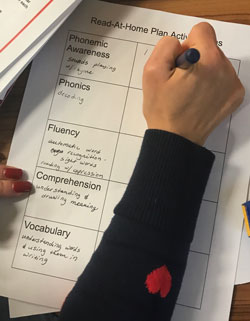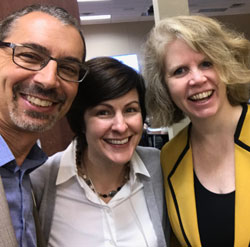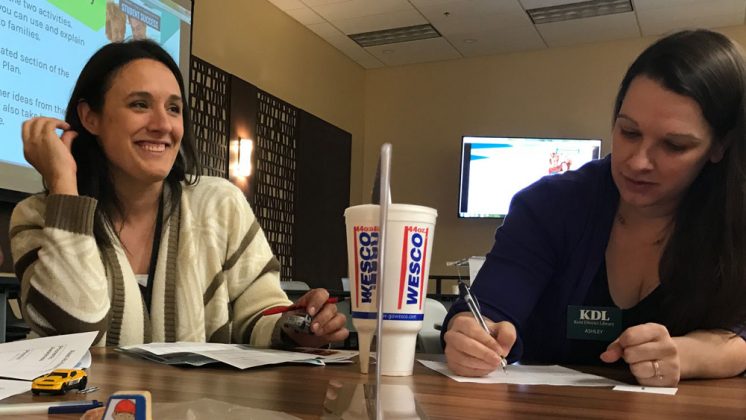Chelsea McCoy dives headfirst into imagination: wildly, enthusiastically, getting right on the floor with youngsters. It’s clear she wants to help them cultivate a love of reading.
McCoy asks a lot of questions: about the last book they read, their hobbies, what happened on their best day yet. She reaches for books as they answer, then lets them explore book jackets and flip through a few pages.

“We want to get the right book in a child’s hands at the right time,” said McCoy, a library assistant at the downtown Grand Rapids Public Library.
But while she delights in encouraging young readers, McCoy has lately become a sounding board for worried parents who have come to the library with their child. The reason? The child’s Individual Reading Improvement Plan (IRIP) from his or her school — a key component of the new state third-grade reading law.
Librarians, like McCoy, are primed to help parents and their children improve the student’s reading, so the student is at grade level by the end of third grade, as required by the law. K-3 students needing extra help are given IRIPs to help them get there.
Although parents have been hesitant to let her read the document, McCoy was briefed on all things IRIP during a training on the new law. The trainings were coordinated by Mike Nassar, director of the Community Literacy Initiative at the Literacy Center of West Michigan, and conducted by early literacy coaches from Kent ISD.

In a partnership with Grand Rapids Public Library, Kent District Library and Grand Rapids Public Schools, Kent ISD early literacy coaches has trained about 100 GRPL and KDL librarians to be literacy cheerleaders. As the IRIPs were introduced for the first time this school year, all KDL and GRPL branches are ready to stimulate and reinforce reading skills, and encourage parents to bring in their struggling reader for supplemental support.
As third-grade reading proficiency varies anywhere from 23 percent to 76 percent across the county, Nassar hopes families will visit their local library branch to engage with reading.
“So the idea here is for us to leverage the librarians’ skills and services so families can come to the library and feel comfortable with needing and asking for help,” Nassar said.
What’s an IRIP?
The IRIP is required by law to identify the reading intervention services a child will receive, and to help remedy any deficiencies identified in an assessment given at the start of the school year. It may include a “Read at Home” plan to help support out-of-school reading, as well as the student’s strengths, areas of concern and a progress monitoring plan.
According to the law, by the 2019-20 school year all third-graders need to be within one year of grade level in reading or face retention. However the law allows several “good cause” exemptions, including the opportunity for parents to excuse their child from retention if approved by the local superintendent. Also, the M-STEP proficiency exam isn’t the sole measure; districts can refer to their own assessments in demonstrating a student’s proficiency.
A Teacher’s Reading Tips for Parents
When reading with your child, change it up to engage them:
Source: Jill Macauley, Stocking Elementary second-grade teacher |
This year’s first-graders will be the first set of third-grade classes impacted by the new law, “so there is an urgency to this work,” said Marla Ehlers, GRPL assistant library director.
“The state wants us to look more closely at literacy, and we introduce literacy at birth,” Ehlers said. “Because talking, writing, reading, playing and singing are really important activities that support literacy.”
All concerned about helping students hope the librarian training on the IRIP gets to the heart of matter. Once the parent and student have signed the IRIP, parents might naturally visit their local library seeking help. Kent ISD early literacy coaches Christi Gilbert, Lisa Hendricks, Katie Momber and Sarah Shoemaker shared this and other information with the librarians at the two-hour training session.
The coaches are eager to help lower elementary students swoon over books, phonics, reading, fluency, vocabulary — and to understand that reading is a living thing.
“Our goal is to help empower library staff to support reading – the joy of reading, to be a place for reading,” said Lindsey Dorfman, director of KDL’s branch services and operations. “We want to share that message, that we’re all working toward solving this.”
CONNECT
Third-Grade Reading Law Frequently Asked Questions (FAQs)
Reading by Third Grade: Our Shared Opportunity, Our Shared Responsibility












